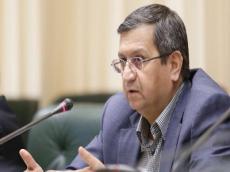|
|
TODAY.AZ / World news
Iran seeks Russian support for North-South Corridor Project
16 September 2024 [23:31] - TODAY.AZ

Iran expects Russia to provide substantial support for the International North-South Corridor, Azernews reports citing foreign media.
The Minister of Economic Affairs and Finance of Iran, Abdulnasir Hemmati, made this statement during a meeting with Igor Levitin, assistant to the Russian President, in Tehran today.
Hemmati noted that the imminent activation of the International North-South Corridor as a key transit route could strengthen cooperation between Iran, Russia, India, and countries around the Persian Gulf.
He added that Iran supports foreign investment in the corridor's development and is prepared to facilitate participation by offering special investment incentives for projects like the Rasht-Astara railway.
"We hope to see an increase in Russian investments in Iran, particularly in oil, logistics, and transit projects," Hemmati said.
During the meeting, Igor Levitin confirmed that Russia has allocated a budget for the construction of the Rasht-Astara railway. This railway is expected to handle 15 million tons of cargo, with the potential to increase capacity to 30-50 million tons.
Levitin emphasized that Russia aims to expedite the International North-South Corridor project. Following instructions from the Russian President, the project is underway, with VTB Bank of Russia overseeing the work.
"The first part of the North-South Corridor project, the Rasht-Astara railway, has completed technical works and is now entering the construction phase with the Ministry of Economy's coordination," he said.
It is noteworthy that on May 17, 2023, Russia and Iran signed an agreement for the Rasht-Astara railway construction in Gilan province, northern Iran. The 163 km railway line will include 9 stations. Upon completion, the railway will enhance the North-South Corridor and connect Iran's railway network to the Caucasus, Russia, and Northern Europe. The construction is expected to cost 1.6 billion euros and be completed within 48 months.
The North-South Corridor was established based on an intergovernmental agreement signed by Russia, Iran, and India on September 12, 2000. The corridor aims to reduce the delivery time of goods from India to Russia and Northern and Western Europe from over 6 weeks to approximately 3 weeks.
The Qazvin-Rasht railway (175 km) was inaugurated on March 6, 2019, connecting Azerbaijani railways with Iran's network within the corridor. The Rasht-Astara railway will be constructed within Iran.
The North-South Corridor has three directions within Iran: the eastern route to Turkmenistan and Central Asian countries, the central route to Russia and other countries via the Caspian Sea, and the western route to Azerbaijan, Georgia, Russia, and Eastern Europe.
URL: http://www.today.az/news/regions/252994.html
 Print version
Print version
Connect with us. Get latest news and updates.
See Also
- 27 November 2024 [23:50]
Lower house of Australian Parliament approves ban on social networks for teenagers - 27 November 2024 [23:20]
Rapid growth of "Big Garbage Patch" records in Pacific Ocean - 27 November 2024 [22:45]
Kyrgyz Emergency Situations Ministry purchase helicopter - 27 November 2024 [22:15]
Word of 2024 in Russia Recognized as "Vibe" - 27 November 2024 [21:40]
Vietnam, Indonesia and the UAE show interest in BrahMos missiles - 27 November 2024 [21:10]
Tajikistan, Maldives cancel visas - 27 November 2024 [20:35]
Strongest snowstorm in last half century hits Seoul - 27 November 2024 [19:30]
Russian ruble hits anti-records - 27 November 2024 [19:05]
Tik Tok blocks beauty filters for teenagers due to mental health problems - 27 November 2024 [13:32]
Israel, Lebanon agree to ceasefire after months of intense conflict
Most Popular
 French politics in all its squalor, lies and hypocrisy
French politics in all its squalor, lies and hypocrisy
 Baku and Washington return to crisis-free relations
Baku and Washington return to crisis-free relations
 This Olivier is rotten, bring a new one
This Olivier is rotten, bring a new one
 Turkish minister: Peace agreement btwn Azerbaijan, Armenia to ensure stability in Caucasus
Turkish minister: Peace agreement btwn Azerbaijan, Armenia to ensure stability in Caucasus
 Banana Parliament of the banana Country
Banana Parliament of the banana Country
 Mugham Center presents concert program "Music Without Borders"
Mugham Center presents concert program "Music Without Borders"
 Kalbajar’s transformation: Symbol of Azerbaijan’s victory, resilience, and economic revival
Kalbajar’s transformation: Symbol of Azerbaijan’s victory, resilience, and economic revival
